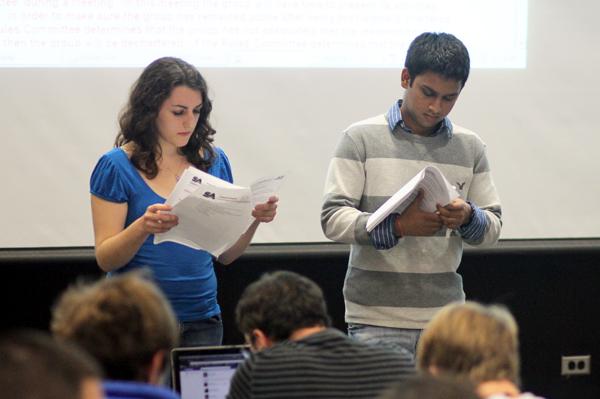
Binghamton University’s Student Association may change its rules for how new student groups become chartered.
At its meeting last Monday, Liz Robins, executive vice president of the SA, and Rahul Aitch, an Assembly representative from off campus, authored and introduced a resolution to change various requirements new student groups must meet in order to receive a charter from the SA.
Under their proposal, new student groups would be limited to forming at the beginning of each semester. Group leaders would have to pick up a charter packet during the first month of each term, and they would only have one month to return it with required information completed.
After submission of the packet, the Assembly’s Rules Committee will choose whether to grant a provisional charter to a group. Groups would then be considered a chartered organization and would have the same rights as chartered groups, but would have to undergo a reassessment after one full semester to determine if they can receive a charter proper.
A new group would lose its charter if it did not pass a list of criteria developed by the Rules Committee, including maintaining its registration and showing evidence of activities.
Currently, students interested in forming a group are able to begin the charter process at any time, without strict deadlines for submitting their proposals.
A prospective group must submit its proposed constitution along with a list of two or more contacts. The group must also include the names of the group’s proposed Executive Board members, the signatures and PODS user names of 10 undergraduate students who will be members of the organization and the signatures of 100 undergraduate students who support the formation of the group.
After these have been submitted, the Rules Committee decides whether or not to charter the group. If the group receives a charter, it can only be revoked if the group fails to register by taking a Treasurer’s Exam for one year or more.
Robins said the current process allows for the proliferation of many defunct groups, and limits the EVP office’s ability to lend assistance to new and existing groups alike. She said she first noticed this trend last year when she served as assistant to then-EVP Jenna Goldin and observed 50 new groups receive charters.
“When there are so many new groups, it gets so crazy,” Robins said. “There is always another meeting with another new group.”
Robins said her proposal would provide relief by allowing the EVP office to devote more time and provide better resources to those trying to start a new organization. She said it would also allow for an “easier removal of groups that fall off the radar.”
“You can’t reach out to 50 groups like you could if there was a solid amount throughout the semester,” Robins said. “I want to give them more attention and expand the resources the office has to offer.”
Julia Mielczarek, a junior double-majoring in English and philosophy, politics and law and a member of OutCrowd Pictures, a student-run sketch video group trying to become SA-chartered, said she supports Robins’ proposal because it seeks to eliminate defunct groups.
“I feel like a lot of wasted funding goes to dead groups, and we need a lot of funding as a film group,” Mielczarek said.
Mielczarek said she also favors the time constraints because it will encourage new groups to organize more efficiently and allow the charter process to move faster.
Robins’ proposal follows a decision made by the SA last spring to conduct an audit of how student groups who hold office space on campus use their offices, which required groups to submit a form detailing the number of members they had, the number of years they held an office and why they need an office.


